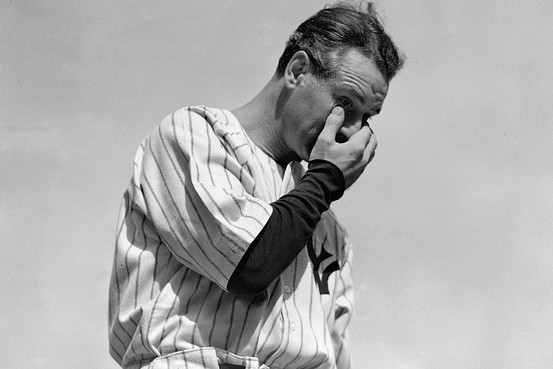On July 4, 1939 a frail Henry Louis Gehrig stepped in front of a packed crowd at Yankee Stadium. The Manhattan-native knew he was sick, but he was unaware that his illness (Amyotrophic lateral sclerosis or ALS) would soon claim his life.
The entire speech goes as follows:
"Fans, for the past two weeks you have been reading about the bad break I got. Yet today I consider myself the luckiest man on the face of the earth. I have been in ballparks for seventeen years and have never received anything but kindness and encouragement from you fans.
Look at these grand men. Which of you wouldn't consider it the highlight of his career just to associate with them for even one day? Sure, I'm lucky. Who wouldn't consider it an honor to have known Jacob Ruppert? Also, the builder of baseball's greatest empire, Ed Barrow? To have spent six years with that wonderful little fellow, Miller Huggins? Then to have spent the next nine years with that outstanding leader, that smart student of psychology, the best manager in baseball today, Joe McCarthy? Sure, I'm lucky.
When the New York Giants, a team you would give your right arm to beat, and vice versa, sends you a gift--that's something. When everybody down to the groundskeepers and those boys in white coats remember you with trophies -- that's something. When you have a wonderful mother-in-law who takes sides with you in squabbles with her own daughter -- that's something. When you have a father and a mother who work all their lives so that you can have an education and build your body--it's a blessing. When you have a wife who has been a tower of strength and shown more courage than you dreamed existed -- that's the finest I know.
So I close in saying that I might have been given a bad break, but I've got an awful lot to live for. Thank you."
I hope the humility in Mr. Gehrig's words is as apparent to you as it is to me. There is not a lot of analysis to be done with this speech, the words speak for themselves, and they are unquestioningly gentle and beautiful.
He was and still is regarded as one of the most outstanding and amicable gentlemen that Major League Baseball has ever seen. The man weakened by ALS, who would pass away at the age of 37, once took the field every day without fail, earning him the nickname "The Iron Horse." From June 1, 1925 to April 30, 1939 he did not miss one game for the Yankees. In that same period, he picked up six World Series rings and two MVP awards.
Even though I have New York bias, there is really no other speech that comes close to Gehrig's iconic "Luckiest Man on the Face of the Earth." The only other sports speech that may be worth mentioning is Jim Valvano's "Don't Ever Give Up" speech. And even though Valvano's speech is wonderful and moving, it doesn't give me the same chills down my back as Gehrig's, but that's just me.
The better question is not where does Gehrig's speech rank in the history of sports, but rather where does Gehrig's speech rank in American history?
You can watch Gehrig's speech here.

